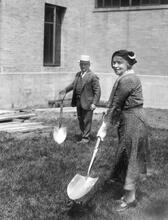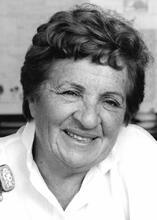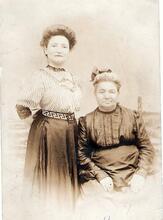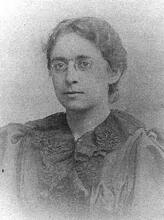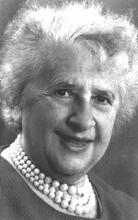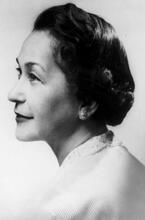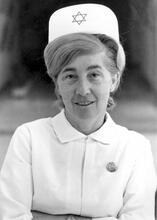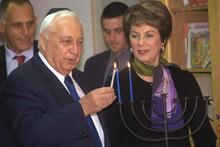Bertha Singer Schoolman
Bertha Singer Schoolman believed so strongly in the importance of Youth Aliyah that she risked her life to help bring convoys to and from kibbutzim. Schoolman taught at the Central Jewish Institute of New York and the Cejwin Camps founded by her husband. A committed Zionist, she headed Hadassah’s Palestine committee, then served as national secretary and vice president. As co-chair of the Jewish Agency’s Youth Aliyah Management Committee, Schoolman oversaw efforts to resettle hundreds of Holocaust refugees in Israel, frequently risking her life. For her bravery, the Israel Ministry of Defense honored her with the Fighter for the State Award, and she was the first American woman to chair the World Zionist Congress’s Actions Committee and Congress Commission.
Like her friend and mentor Henrietta Szold Bertha Schoolman gave a lifetime of service to the betterment of Jewish education and to the cause of Youth Aliyah, the movement to bring Jewish youth out of Germany to live in children’s villages in Israel. In the words of her friend and eulogist Marian G. Greenberg, Schoolman was “a woman of moral and intellectual integrity, who had the courage to live in accordance with her convictions.”
Early life, education, and Hadassah
Bertha Schoolman was born in New York City on December 9, 1897. She graduated from Hunter College in 1919 and from the Teachers Institute of the Jewish Theological Seminary of America in 1921. A committed Jewish educator, Bertha Schoolman taught at the Central Jewish Institute of New York, the first American Jewish community center with an educational focus. Throughout her life, she would also play an important role in the administration and educational programs of the Cejwin Camps, founded in 1919 by her husband, Albert.
A lifelong Zionist, Bertha Schoolman acted on her convictions by taking her two young daughters to Palestine for extended visits and schooling as early as 1931 and again in 1937–1938. In the United States, Schoolman implemented her Zionist beliefs through her active involvement in Hadassah, the Women’s Zionist Organization of America. She served as national secretary from 1940 to 1941 and as vice president from 1941 to 1943. For six years (1921–1927), she headed the Hadassah Palestine Committee, which then supervised all of Hadassah’s educational and medical projects. She chaired other important Hadassah committees, including the Jewish National Fund (Keren Kayemet) Hadassah Medical Organization committee, Zionist relations, and political relations. She also wrote articles for the Hadassah Newsletter (now Magazine), the Jewish Social Service Quarterly, and the Reconstructionist Magazine. In 1947, she received the Outstanding Alumni Award from the Teachers Institute of the Jewish Theological Seminary of America.
Schoolman and the Youth Aliyah
It was in 1947, too, that Schoolman’s vital service to Youth Aliyah began when she accepted the Jewish Agency’s urgent call to act as cochair of its Youth Aliyah Management Committee. Bertha Schoolman responded to the emergency summons, despite potential physical danger and personal sacrifice. She arrived in Palestine on November 28, 1947, the day before the United Nations General Assembly voted for the Partition Plan for Palestine and Jewish statehood. From 1947 to 1953, she spent six months of each year in Israel, away from her family, helping Youth Aliyah to cope with the enormous task of caring for hundreds of young survivors of European extermination camps and ghettos. On one occasion, while riding in a convoy to welcome refugees, she narrowly escaped death from the weapons that killed Hans Beyth, acting director of Youth Aliyah. It was fitting that on the occasion of naming the reception center at Ramat Hadassah-Szold in Bertha Schoolman’s honor, Moshe Kol compared her service to that of “a soldier in the front lines for whom no place is too remote, no duty too dangerous.” In recognition of her service in Israel prior to the establishment of the state, Schoolman was given the Fighter for the State Award by the Israel Ministry of Defense on Independence Day in 1969.
During the difficult days of 1947–1948, when Hadassah Hospital on Mount Scopus had to be abandoned and medical services reorganized, Schoolman joined a small group of Hadassah leaders from America to assist the directors of the Hadassah Medical Organization. Her creative concern for the future of the young refugees led to her involvement in the founding in 1949 of the Neve Hadassah Youth Village near A voluntary collective community, mainly agricultural, in which there is no private wealth and which is responsible for all the needs of its members and their families.kibbutz Tel Yitzhak in Central Sharon.
World Zionist Congress and beyond
Bertha Schoolman, who had been a member of the World Zionist Actions Committee from 1937, attended historic sessions of the World Zionist Congress in Europe and Israel. She was the first American Jewish woman to chair the Actions Committee and Congress Commissions and deliver reports to the plenary sessions in fluent Hebrew.
A member of the Society for the Advancement of Judaism and of the board of directors of the Jewish Reconstructionist Foundation, Bertha Schoolman’s educational philosophy was rooted in the Reconstructionist approach to Judaism. She died on January 6, 1974, after a long illness.
AJYB 76:517.
EJ; Obituary. NYTimes, January 9, 1974, 38:2.
Schoolman, Bertha Singer. Papers. Hadassah Archives, NYC.

